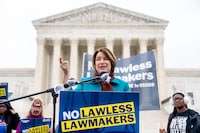“Right-wing extremists,” Hillary Clinton announced in a video for a progressive group released in October, “already have a plan to literally steal the next presidential election. And they’re not making a secret of it. The right-wing-controlled Supreme Court may be poised to rule on giving state legislatures … the power to overturn presidential elections.”
This is the most mischaracterized Supreme Court case in recent memory

The former presidential candidate was echoing news coverage of Moore v. Harper, the elections case the court heard on Wednesday. But if the justices were advancing a “plan” to “literally steal” the next election, it was not evident in three hours of civil colloquies with lawyers. Moore v. Harper has the unhappy distinction of being the subject of more political and media distortion than any Supreme Court case in recent memory.
The case will not, no matter which side wins, grant state legislatures “the power to overturn presidential elections.” In fact, after oral argument, it appears that Moore v. Harper — pitched as a potential blockbuster example of judicial partisanship — could produce a fairly technical and limited legal outcome. The more significant feature of the case is that the two sides’ approaches to federalism cut across ideological lines.
Here’s the background of the case: In 2021, North Carolina’s Republican-dominated legislature (the house speaker is Timothy Moore) created a map for the state’s congressional districts that favored the GOP. The map was challenged in court, including by a resident named Rebecca Harper. The state’s Supreme Court, which at the time had a majority of elected Democratic justices, found in 2022 that the gerrymandering violated the state constitution’s guarantee that “all elections shall be free.” The court drew a map less favorable to Republicans for use in November’s congressional elections.
Follow Jason Willick‘s opinions
FollowNorth Carolina Republicans appealed to the U.S. Supreme Court. They pointed to the federal Constitution’s elections clause, which says that the “times, places and manner” of congressional elections in a state “shall be prescribed … by the legislature.” They argued that the state court had commandeered the legislature’s constitutional responsibility to prescribe congressional maps. Harper argued in response that a legislature is not independent, but constrained by the state constitution and state courts.
This is a classic problem of constitutional procedure with plausible arguments on both sides — exactly what the Supreme Court is designed to settle so American democracy can function smoothly. Yet news coverage cast the “independent state legislature theory” as “fringe” and sinister, intimating that it could lead to the theft of presidential elections.
What prompted all the partisan fire and fury? For one, Donald Trump. His pressure on state legislatures to overturn the 2020 election results was sinister. But this case has virtually nothing to do with it. Federal law prevents state legislatures from changing the popular vote outcome after the fact. State legislatures have always had the power to appoint presidential electors themselves instead of holding elections, as Colorado did in 1876. But the impact of Moore v. Harper on that remote proposition is purely speculative.
Neither absolutist position in Moore v. Harper is tenable. While it is difficult to believe state courts have no role in interpreting election law, it’s also hard to believe they could, consistent with the text of the Constitution, box legislatures out of the process altogether. I wrote in July that liberals could increase their chances of a favorable ruling before the current, right-leaning Supreme Court by contemplating a middle-ground outcome.
One prominent partisan election lawyer called this argument “idiocy.” Oops. It turns out that a middle ground is exactly what the hinge justices — Brett M. Kavanaugh, Amy Coney Barrett and John G. Roberts Jr. — appeared to be driving at in oral argument. The three lawyers arguing for Harper conceded that state courts can go too far. Roberts wondered whether there was overlap between the two sides in their fallback positions. “When you’re falling back,” he asked one of the lawyers, “do you bump into Mr. Thompson” — North Carolina’s lawyer, David Thompson — “when he’s falling back the other way?”
In practice, Moore v. Harper is not an up-or-down verdict on a fringe legal theory, but a where-do-you-draw-the-line exercise on important but ambiguous constitutional language. In that respect, the case was always less interesting than it was made out to be.
What is interesting is the way it scrambles traditional views of election federalism, with progressives rallying behind an argument to maximize state authority over elections. Meanwhile, conservatives, normally champions state sovereignty, are urging the Supreme Court to intervene in North Carolina’s election process. When Democrats recently tried to pass voting-rights legislation rewriting state election codes, federalism arguments ran in the opposite direction.
Sometimes, such dynamics are driven by partisan interest — but in Moore v. Harper, it’s not entirely clear which side would benefit from one ruling or another. This suggests the controversy over the meaning of the Constitution’s elections clause is the result of competing legal methodologies, rather than partisanship. Moore v. Harper reflects judicial authority applied as it’s supposed to be. As far as the health of democracy goes, the wild public distortions of the case are a greater concern.






